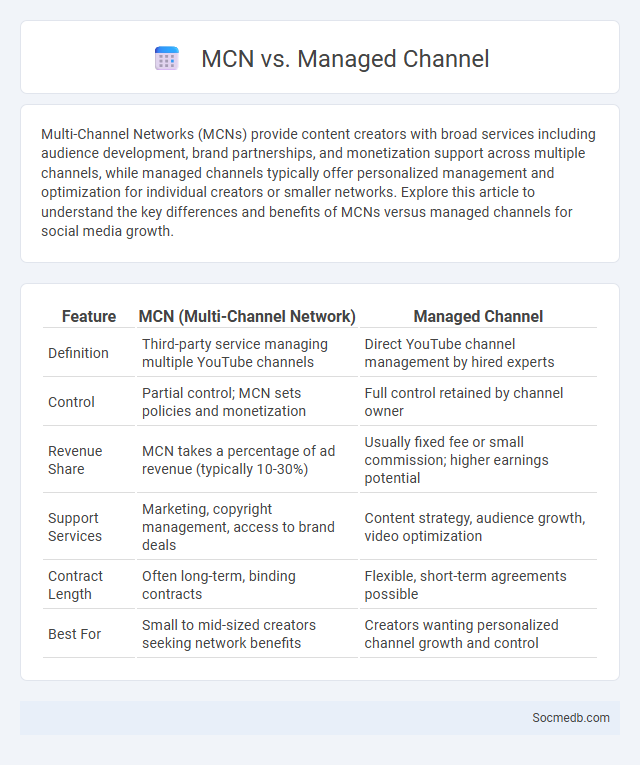
Photo illustration: MCN vs Managed Channel
Multi-Channel Networks (MCNs) provide content creators with broad services including audience development, brand partnerships, and monetization support across multiple channels, while managed channels typically offer personalized management and optimization for individual creators or smaller networks. Explore this article to understand the key differences and benefits of MCNs versus managed channels for social media growth.
Table of Comparison
| Feature | MCN (Multi-Channel Network) | Managed Channel |
|---|---|---|
| Definition | Third-party service managing multiple YouTube channels | Direct YouTube channel management by hired experts |
| Control | Partial control; MCN sets policies and monetization | Full control retained by channel owner |
| Revenue Share | MCN takes a percentage of ad revenue (typically 10-30%) | Usually fixed fee or small commission; higher earnings potential |
| Support Services | Marketing, copyright management, access to brand deals | Content strategy, audience growth, video optimization |
| Contract Length | Often long-term, binding contracts | Flexible, short-term agreements possible |
| Best For | Small to mid-sized creators seeking network benefits | Creators wanting personalized channel growth and control |
Introduction to MCN and Managed Channel
Multi-Channel Networks (MCNs) are organizations that partner with multiple YouTube creators to provide services such as audience development, content programming, and monetization strategies. Managed Channels refer to YouTube channels that are overseen by MCNs or other agencies to optimize growth, engagement, and revenue through tailored content management and analytics. These structures streamline content distribution and amplify reach by leveraging expertise in digital marketing and platform-specific algorithms.
What is a Multi-Channel Network (MCN)?
A Multi-Channel Network (MCN) is an organization that partners with multiple YouTube creators to offer services like audience development, content monetization, and brand collaborations. MCNs help YouTubers optimize their channels by providing access to advanced analytics, copyright management, and advertising opportunities, enhancing Your potential earnings and reach. By leveraging aggregated viewers and creators, MCNs create a scalable platform for maximizing social media influence and revenue.
What is a Managed Channel?
A managed channel in social media refers to a branded online presence overseen by a dedicated team to ensure consistent content, engagement, and brand messaging across platforms like Facebook, Instagram, or LinkedIn. Your managed channel streamlines communication with your audience, utilizing analytics and strategic planning to optimize reach and impact. Effective management enhances brand reputation, drives customer interaction, and supports targeted marketing campaigns.
Core Differences: MCN vs Managed Channel
Multi-Channel Networks (MCNs) aggregate multiple YouTube creators under one umbrella to provide resources like monetization, audience growth tools, and brand partnerships, while Managed Channels offer personalized, one-on-one management focusing on strategy, content optimization, and direct support. MCNs leverage scale to optimize ad revenue and cross-promotion opportunities across a broad creator base, whereas Managed Channels deliver tailored guidance and customized marketing plans to individual creators or brands. Key distinctions include the breadth of service scope, level of personalized attention, and control over content strategy and monetization methods.
Benefits of Partnering with an MCN
Partnering with a Multi-Channel Network (MCN) offers content creators access to enhanced monetization opportunities across platforms like YouTube, including brand deals and ad revenue optimization. MCNs provide expert support in rights management, audience growth strategies, and technical assistance, boosting channel visibility and subscriber engagement. Leveraging the network's resources also allows creators to focus more on producing quality content while maximizing their social media influence and income streams.
Advantages of Managed Channels for Creators
Managed social media channels provide creators with expert content strategy, audience targeting, and consistent posting schedules, significantly boosting engagement and growth. Your brand benefits from professional analytics monitoring and timely interactions, enhancing credibility and follower loyalty. Outsourcing channel management frees you to focus on content creation while ensuring your online presence remains active and optimized.
Revenue Models: MCN vs Managed Channel
Multiple Channel Networks (MCNs) generate revenue primarily through ad sales, brand partnerships, and content licensing by aggregating numerous creators under one umbrella, allowing for economies of scale and diversified income streams. Managed Channels typically earn revenue via direct content monetization such as ad revenue shares, sponsorships, and merchandise sales, with a more hands-on approach to brand collaboration and audience engagement. While MCNs leverage large networks to maximize advertising revenue and cross-promotion, Managed Channels focus on personalized management to optimize creator earnings and brand alignment.
Control, Ownership, and Support Comparison
Social media platforms differ significantly in control, ownership, and support structures; centralized networks like Facebook impose strict content moderation and centralized data ownership, while decentralized platforms such as Mastodon offer user-controlled accounts and distributed data hosting. Ownership models impact user privacy and data security, with centralized platforms collecting extensive personal data, whereas decentralized alternatives prioritize user autonomy and minimal data retention. Support varies, as major platforms provide formal, large-scale customer service and automated tools, contrasting with community-driven or peer-based support typical of decentralized social media ecosystems.
Choosing the Right Model for Your Channel
Selecting the right content model for your social media channel hinges on understanding your target audience's preferences and platform algorithms. Data-driven approaches such as audience segmentation and engagement analytics improve model alignment with user behavior, enhancing reach and interaction. Tailoring formats--whether video, carousel, or stories--to platform-specific trends maximizes content visibility and conversion rates.
Conclusion: MCN or Managed Channel – Which Suits You?
Choosing between an MCN (Multi-Channel Network) and a managed channel depends on your content goals, audience engagement strategy, and monetization needs. MCNs offer extensive resources and support for scaling reach and revenue, while managed channels provide personalized guidance and creative control. Assessing your priorities in growth, collaboration, and brand identity will help determine the best fit for maximizing your social media influence.
 socmedb.com
socmedb.com